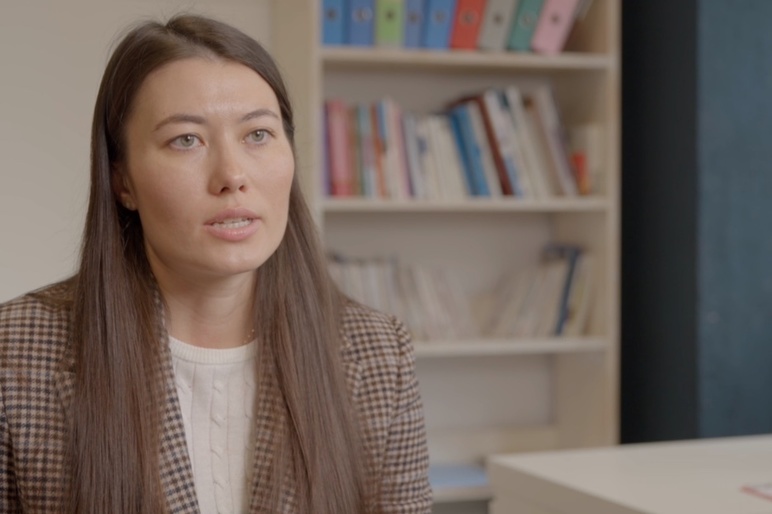Preventing torture in war: insights from Ukrainian human rights defender
Last April, the United Nations Committee Against Torture reviewed Ukraine’s state on torture. The Committee especially examined the conditions seen in detention facilities, the increase in deaths in custody, and the lack of investigations reaching the courts. Attending the session was Maryna Demura, a human rights defender from Kharkiv, a Ukrainian city that has been frequently targeted due to its proximity to Russia. As Project Manager of the Human Rights Center ZMINA and associate professor of criminal procedure at Yaroslav Mudryi National Law University, Demura plays a key role in monitoring conditions in detention facilities. She now shares her insights on Ukraine’s remaining gaps in the fight against torture, but also what still gives her hope for the future.

What have been some of the most pressing challenges with your work with ZMINA?
The most challenging is the absence of access to victims in the Ukrainian territories occupied by Russia. A lot of places of detention were in the occupied territories of Kharkiv, Zaporizhzhia and Donetsk regions. It made it impossible to access documentation about cases of torture, or for witnesses to testify in court.
Based on your visits to places of detention, what are the most concerning human rights violations you have observed?
I am a monitor of the National Preventative Mechanisms (NPM), which is a system meant to facilitate visits to detention centers, and prevent the risk of torture or ill-treatment. As a monitor, when visiting places of detention, we recorded violations of the rights to privacy, a healthy environment, and access to simple items in the cells.
Are Ukrainian prisons prepared, in case of Russian attacks?
Ukrainian prisons are not prepared for Russian attacks, but unfortunately it is currently impossible to do anything. The biggest challenge is the absence of bomb shelters in these places of detention. There are also no clear procedures for what human rights monitors should do in case of an attack.
What legal safeguards, protections built into the law to make sure people’s rights are respected, are currently missing in Ukraine to protect detainees from torture?
Three major protections are still weak in Ukraine. There is a problem with access to an independent lawyer. In the case of a lawyer provided by the state, the problem is the effectiveness of the protection provided. Second, they may not always be examined by an independent doctor. Lastly, their families don’t often receive timely or accurate information about where they are or what is happening to them.
How effective has Ukraine been in prosecuting those responsible for torture?
Ukraine has made progress in the investigation of cases of torture, but the effectiveness of those investigations is a very sensitive problem for Ukrainian society, because a lot of cases are left unfinished. In the report we submitted to the Committee Against Torture, we described the case of the Zamkova prison, where, like other cases, a decision has still not been reached, showing how ineffective the system still is.
What challenges do victims of torture face in seeking justice and support?
Victims face many barriers to healing and justice. There are no government-run programmes to help them recover physically or mentally, they have to come from civil society organisations instead. Receiving financial compensation through the justice system is also very difficult, so much so that it is often easier to activate compensation following rulings from international judicial bodies like the European Court of Human Rights than in Ukraine. Victims also often don’t know the amount of compensation they will receive because of how unpredictable the process can be.
What message would you like to send to international organisations and the UN Committee Against Torture regarding Ukraine’s progress and challenges?
Ukraine has a lot of problems when it comes to the prevention of torture, but we need to emphasise our progress. That progress can be seen among others in the development of NPMs, allowing independent monitors to visit detention facilities, improving the custody record system, which helps track how detainees are treated, and by placing human rights inspectors in places of detention, which will help carry out proper investigations.
Ukraine has taken many steps to improve the prevention of torture despite the war, despite Russian aggression. Still, decisions of international bodies and institutions can help Ukraine see the remaining gaps and find new ways to improve.
Despite the challenges, what gives you hope for the future of human rights and justice in Ukraine?
For me, it’s the development of human rights organisations like ZMINA, along with the cooperation with an organisation like OMCT. Having the opportunity to describe our situation in front of the Committee Against Torture, giving us the possibility to improve things, also gives me hope. The cooperation between people as well, and the dedication I see from colleagues in the prevention of torture, gives me a lot of hope for the future.
Source: OMCT
If you have found a spelling error, please, notify us by selecting that text and pressing Ctrl+Enter.















